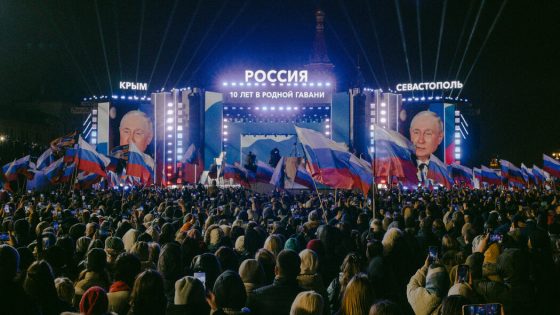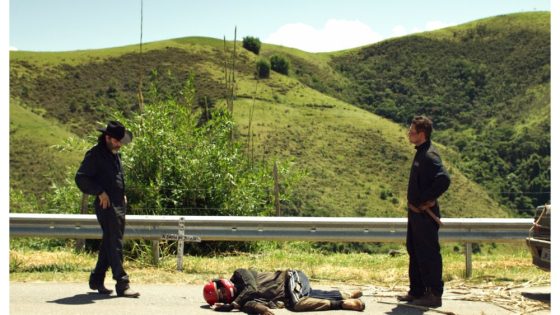His most beloved crooner sang a nationalistic ballad with an appeal to Russians: “The Motherland is calling. Don’t let her down.”
His favorite band belted out a moody song about wartime sacrifice.
And then he took the stage, under a banner celebrating the 10th anniversary of Crimea’s seizure from Ukraine, to remind thousands of Russians gathered on Red Square that his fight to add territory to Russia wasn’t over.
President Vladimir V. Putin, a day after declaring victory in a performative election, signaled on Monday that the war against Ukraine would continue to dominate his rule and called for unity in bringing the people of eastern Ukraine “back to their home family.”
“We will move on together, hand in hand,” Mr. Putin told the crowd, boasting of a restored railroad line that he said would soon connect to Crimea through territory taken from Ukraine. “And this is precisely what really makes us stronger — not words, but deeds.”
The display of nationalistic fervor came as the capstone of a three-day election whose foregone conclusion prompted comparisons of Mr. Putin’s Russia to other authoritarian dictatorships. On Sunday night, the state news swiftly declared that he had won more than 87 percent of the vote.
Underscoring the artificial nature of the election, Mr. Putin brought the three puppet competitors the Kremlin had picked to run against him onto the stage on Red Square and offered each a turn at the microphone, saying they all took “different approaches” but had “one Motherland.”
The communist candidate, whom the Russian authorities called the second-place finisher, with just over 4 percent of the vote, praised Mr. Putin for bringing Crimea back to “home port.”
The nationalist candidate said Crimea would forever be part of Russia on the maps of the world and led a cheer: “To Russia, to our great future and to the president of a great Russia!”
The last candidate, from the New People party, said he would never forget the pride he had in Mr. Putin when he annexed Crimea in 2014.
“Happy holiday!” Mr. Putin shouted. “Long live Russia!”
The crowd broke into the Russian national anthem before men in military uniforms with pro-war “Z” patches and medals took the stage and joined a singer in a war ballad. “Give him the strength to win,” went the chorus.
Mr. Putin, 71, showed little of the emotion he at times has displayed at similar events in the past, such as when he appeared to tear up during a victory speech after the 2012 election. He mouthed the words to the national anthem with relatively little enthusiasm and quickly left the event.
The celebration made clear that the war against Ukraine had come to be the organizing principle of Mr. Putin’s rule, and it was held as Russians braced for what might come next in a country still fighting on the battlefield and led by a newly emboldened leader.
The massive crowd that gathered on Red Square was made up in part of government workers, students and others who were given tickets and in some cases asked to attend, a common practice for pro-Kremlin rallies in Russia.
A 59-year-old social worker, who gave her name as Nadya and arrived waving a giant Russian flag and wearing a folk headdress known as a kokoshnik, said that she did not want war but that the West needed to stop antagonizing Russia. Russia, she said, needs to be respected, and ending the hostilities is not up to Mr. Putin.
“It doesn’t depend on us,” she said. “It’s the West. England, America — they want to divide us up and make us into little colonies.”
For many Russians, the big worry now is of another military draft, as Mr. Putin doubles down on his invasion.
A 29-year-old government analyst at the celebration, who gave his name as Maksim, said that failing to see any other candidates as strong as Mr. Putin, he had voted for him. But he expressed sympathy for the people who live in Ukraine, as well as for Russian soldiers fighting on the front, and acknowledged that he feared another draft.
“I worry about it, I worry about it every day,” he said. “We don’t know what will happen even tomorrow.”
There are other jitters as well, from the expectation of higher taxes to the possibility of greater repression. Mr. Putin, newly elected to his fifth term, could reshuffle his cabinet, a typical post-election procedure that some analysts believe he could use this time around to elevate the most hawkish members of the ruling elite.
Tatiana Stanovaya, a senior fellow at the Carnegie Russia Eurasia Center, predicted that Mr. Putin would seek to renew the personnel in his “power vertical,” the common term for the political system he has honed that has turned post-Soviet Russia into an autocracy. She said he could seek to promote young, loyal, pro-war bureaucrats over the older generation of officials — mostly men born in the 1950s — who now dominate the upper echelons of his system.
“In times of war, the ‘youngs hawks’ are, potentially, increasingly in demand,” she wrote.
Mr. Putin is scheduled to be inaugurated in May — a moment of pomp and circumstance that the Kremlin has fashioned into a televised ritual that demonstrates his grip on the Russian state, and an occasion on which he is likely to give a speech setting out a vision for the next six years.
But in the hours after the polls closed on Sunday, Mr. Putin was quick to make clear that his top priority was to continue waging his invasion of Ukraine, until Kyiv and the West agree to a peace deal on his terms.
He said at an after-midnight news conference that Russia wanted talks to build “peaceful, neighborly relations in the long term,” not a deal that would allow Ukraine “to take a pause for a year and a half or two years in order to rearm.”
Repeating a warning he made last summer, Mr. Putin said that Russia could seek to create a “security zone” on Ukrainian territory that Russia does not currently control.
He did not offer details, but analysts believe that such a buffer zone would entail an effort to capture parts of the Kharkiv region of Ukraine — an assault that could require a new military draft.
But analysts also cautioned that, given the opacity of Mr. Putin’s government, it is hard to predict how much will really change. To the extent that Mr. Putin does replace some of his top officials, his priorities will be their “loyalty first and effectiveness second,” said Grigorii Golosov, a political scientist in St. Petersburg.
The orchestrated outpouring of support for Mr. Putin on Monday on Red Square, which was beamed over state television across the country, was designed to communicate that supporting the Russian leader was the patriotic, commonplace thing to do.
Before the invasion of Ukraine, political scientists studying Russia found that the perception of Mr. Putin’s popularity helped drive his actual support and keep him in power. Many Russians had the sense that everyone around them was supporting the Russian leader.
“People like to go along with the crowd,” said Noah Buckley, a political science professor at Trinity College Dublin and co-author of the research. “People like to be on the winning side.”
That sort of support can collapse quickly if the perception of popularity erodes, Mr. Buckley noted. But, he said, “I certainly don’t predict that around this election or anytime soon.”
Source Agencies



